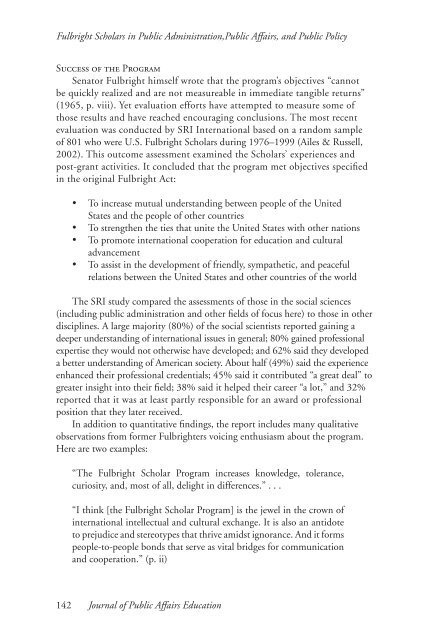Journal of Public Affairs Education
You also want an ePaper? Increase the reach of your titles
YUMPU automatically turns print PDFs into web optimized ePapers that Google loves.
Fulbright Scholars in <strong>Public</strong> Administration,<strong>Public</strong> <strong>Affairs</strong>, and <strong>Public</strong> Policy<br />
Success <strong>of</strong> the Program<br />
Senator Fulbright himself wrote that the program’s objectives “cannot<br />
be quickly realized and are not measureable in immediate tangible returns”<br />
(1965, p. viii). Yet evaluation efforts have attempted to measure some <strong>of</strong><br />
those results and have reached encouraging conclusions. The most recent<br />
evaluation was conducted by SRI International based on a random sample<br />
<strong>of</strong> 801 who were U.S. Fulbright Scholars during 1976–1999 (Ailes & Russell,<br />
2002). This outcome assessment examined the Scholars’ experiences and<br />
post-grant activities. It concluded that the program met objectives specified<br />
in the original Fulbright Act:<br />
• To increase mutual understanding between people <strong>of</strong> the United<br />
States and the people <strong>of</strong> other countries<br />
• To strengthen the ties that unite the United States with other nations<br />
• To promote international cooperation for education and cultural<br />
advancement<br />
• To assist in the development <strong>of</strong> friendly, sympathetic, and peaceful<br />
relations between the United States and other countries <strong>of</strong> the world<br />
The SRI study compared the assessments <strong>of</strong> those in the social sciences<br />
(including public administration and other fields <strong>of</strong> focus here) to those in other<br />
disciplines. A large majority (80%) <strong>of</strong> the social scientists reported gaining a<br />
deeper understanding <strong>of</strong> international issues in general; 80% gained pr<strong>of</strong>essional<br />
expertise they would not otherwise have developed; and 62% said they developed<br />
a better understanding <strong>of</strong> American society. About half (49%) said the experience<br />
enhanced their pr<strong>of</strong>essional credentials; 45% said it contributed “a great deal” to<br />
greater insight into their field; 38% said it helped their career “a lot,” and 32%<br />
reported that it was at least partly responsible for an award or pr<strong>of</strong>essional<br />
position that they later received.<br />
In addition to quantitative findings, the report includes many qualitative<br />
observations from former Fulbrighters voicing enthusiasm about the program.<br />
Here are two examples:<br />
“The Fulbright Scholar Program increases knowledge, tolerance,<br />
curiosity, and, most <strong>of</strong> all, delight in differences.” . . .<br />
“I think [the Fulbright Scholar Program] is the jewel in the crown <strong>of</strong><br />
international intellectual and cultural exchange. It is also an antidote<br />
to prejudice and stereotypes that thrive amidst ignorance. And it forms<br />
people-to-people bonds that serve as vital bridges for communication<br />
and cooperation.” (p. ii)<br />
142 <strong>Journal</strong> <strong>of</strong> <strong>Public</strong> <strong>Affairs</strong> <strong>Education</strong>



